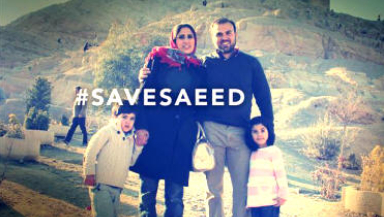
The American Center for Law and Justice (ACLJ), which defends human rights and religious freedom, said an appeals court in Tehran has rejected the appeal of American Pastor Saeed Abedini, a US citizen, and refused to reduce his eight year prison sentence.
Speaking in an ACLJ news release, Abedini's wife Naghmeh called the decision "devastating." The ACLJ said it is now exploring all legal and governmental options available.
"While we remained hopeful that Iran would use its own appeal process to finally show respect for Pastor Saeed's basic human rights, again Iran has demonstrated an utter disregard for the fundamentals of human rights," said Jordan Sekulow, executive director of the ACLJ, (which represents Abedini's wife and their two children) speaking in the news release.
Sekulow continued, "We are exploring all options with Pastor Saeed's family, including options in this country and abroad to bring more pressure on Iran from the U.S. and other countries around the world."
He added, "This legal decision also signals a new level of concern for Pastor Saeed's safety. By keeping the eight year prison sentence in place, Pastor Saeed now potentially faces additional beatings and abuse inside Evin Prison - treatment that has significantly weakened him during h is first year in prison."
"The news out of Iran is devastating to our family," said Naghmeh Abedini in the news release. "Our family will be consulting with legal counsel in Iran to determine the next course of action. The family could appeal the case to the Supreme Court in Tehran or plead for the Supreme Leader, Ayatollah Khamenei, to intervene and pardon Pastor Saeed."
She added, "From past cases, we know that the decision to release my husband lies solely at the mercy of the Supreme Leader. It is imperative in the coming days, weeks and months that we remain vigilant to call for Pastor Saeed's release. This includes continuing to put pressure on Iran from the U.S. government and governments around the world."
Naghmeh Abedini also expressed disappointment in the U.S. government. "I am disappointed that as a country that was founded on religious freedom, our government has been awkwardly silent as an American citizen is wasting away in an Iranian prison because he chose to practice his God-given right to choose his religion."
She continued, "My husband is serving eight years in the notorious Evin Prison, and facing daily threats and abuse by radicals because he refuses to deny his Christian faith. And yet my President, President Obama, has not spoken a word about him."
The ACLJ said in its news release that the decision to reject Abedini's appeal came from Branch 36 of the Tehran Court of Appeals, and was handed down by a two-judge panel that refused to provide Abedini's Iranian attorney with a written copy of the decision.
One of the judges who issued the decision is Ahmad Zargar, who the ACLJ said was sanctioned by the European Union for issuing long term and death sentences for peaceful protesters.
Abedini, 33, was convicted of threatening the security of Iran because he chose to peacefully gather with other Christian believers.
On Jan. 27 2013, Judge Pir Abassi, a judge presently sanctioned by the European Union for his human rights abuses, found Abedini's Christian faith and activities amoun ted to a national security threat, and sentenced him to a prison term of eight years.
The rejection of Abedini's appeal comes just one month before the first year anniversary of his imprisonment.
The ACLJ said there will be prayer vigils in this country and around the world on Sept. 26 - a united effort to call attention to Abedini's plight, and an opportunity to advocate his release.
The ACLJ has been working in this country and abroad to secure his freedom, and says it has heard from nearly 620,000 people demanding his release.
Led by ACLJ Chief Counsel Jay Sekulow, the American Center for Law and Justice is headquartered in Washington, D.C. and has affiliated offices in Israel, Russia, Kenya, France, Pakistan and Zimbabwe.













